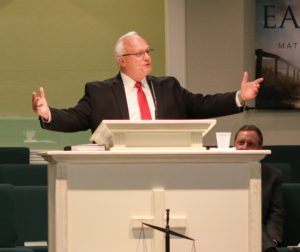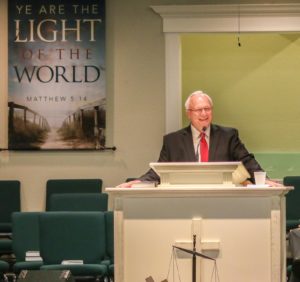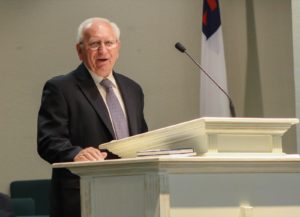Many of the morning sessions centered around Hebrews 11 and the eternal weight of glory lived out by men and women mentioned there. We were encouraged to allow the eternal weight of glory to impact our own spiritual journeys. To listen to the audio of the sermon, click on the sermon title. (Note: This will take you to our Uplift website. You may be asked to login using the username wwntbm and the password gospel.) If you would like to email the preacher and let him know how his message spoke to your heart, you can click the name below the title.
The Eternal Weight of Glory in the Life of Isaac
John O’Malley
 Although Isaac was the son of promise, we know very little of his life in comparison to the lives of his father, Abraham, and his son, Jacob. Isaac stood in gap and passed on his knowledge of God to the future generation because God’s character was evident in his own life. He learned of God’s purity at his circumcision. He often rehearsed God’s promises with his own father. He saw God’s provision on Mount Moriah. He felt God’s peace as he meditated at the well Lahairoi. May the Eternal Weight of Glory motivate us to pass on the torch even when nobody recognizes our accomplishments.
Although Isaac was the son of promise, we know very little of his life in comparison to the lives of his father, Abraham, and his son, Jacob. Isaac stood in gap and passed on his knowledge of God to the future generation because God’s character was evident in his own life. He learned of God’s purity at his circumcision. He often rehearsed God’s promises with his own father. He saw God’s provision on Mount Moriah. He felt God’s peace as he meditated at the well Lahairoi. May the Eternal Weight of Glory motivate us to pass on the torch even when nobody recognizes our accomplishments.
The Eternal Weight of Glory in the Life of Jacob
Gene Krachenfels
Jacob’s life included many trials and contrasts, but his legacy was one of faith, and his  knowledge of the eternal glory is revealed in the names of his sons. Reuben’s name references a son and points to the Person of Redemption in Christ. Simeon’s name, “hearing,” indicates the Preaching of Redemption. Levi’s name means “joining” and thereby shows the Peace of Redemption as we are made one in Christ. Judah sang forth the Praise of Redemption. Dan exemplified the Pardon of Redemption, as God judged our sins on the cross. Naphtali’s name refers to wrestling, and thus the Problem of the Redeemed, as our trials are not over at salvation. Gad’s name means “troop,” and points to the People of the Redeemed, indicating that the entire world can be saved! Asher’s name is a reference to blessed happiness, and reveals the Pleasure of the Redeemed through the great joy of salvation. Issachar’s name means “hiring” and thus shows us the Position of the Redeemed as servants. Zebulun was named as a reference to dwelling, and God has given the Promise of the Redeemed that we will dwell with Him eternally. Joseph’s name was Rachel’s plea for God to add to her, and reveals the Progress of the Redeemed, as we should continue to add to our faith and grow in grace. Jacob’s last son was given two names. His first, Benoni, indicates the “son of sorrow” and points to the Price of Redemption. But his second name, Benjamin, means “son of the right hand” and thus points to the Power of Redemption, as God is the author and finisher of our faith. May our view of the Eternal Weight of Glory allow us to leave behind a godly heritage.
knowledge of the eternal glory is revealed in the names of his sons. Reuben’s name references a son and points to the Person of Redemption in Christ. Simeon’s name, “hearing,” indicates the Preaching of Redemption. Levi’s name means “joining” and thereby shows the Peace of Redemption as we are made one in Christ. Judah sang forth the Praise of Redemption. Dan exemplified the Pardon of Redemption, as God judged our sins on the cross. Naphtali’s name refers to wrestling, and thus the Problem of the Redeemed, as our trials are not over at salvation. Gad’s name means “troop,” and points to the People of the Redeemed, indicating that the entire world can be saved! Asher’s name is a reference to blessed happiness, and reveals the Pleasure of the Redeemed through the great joy of salvation. Issachar’s name means “hiring” and thus shows us the Position of the Redeemed as servants. Zebulun was named as a reference to dwelling, and God has given the Promise of the Redeemed that we will dwell with Him eternally. Joseph’s name was Rachel’s plea for God to add to her, and reveals the Progress of the Redeemed, as we should continue to add to our faith and grow in grace. Jacob’s last son was given two names. His first, Benoni, indicates the “son of sorrow” and points to the Price of Redemption. But his second name, Benjamin, means “son of the right hand” and thus points to the Power of Redemption, as God is the author and finisher of our faith. May our view of the Eternal Weight of Glory allow us to leave behind a godly heritage.
The Eternal Weight of Glory in the Life of Abraham
Barry Goodman
 The call on Abraham’s life showed God’s mandate and plan. Abraham’s life also reveals that there is a cost to the mission, as he was to leave behind his life and family. When he finally moved on from Haran, he faced a crisis in the menace of the people. He had moved from living with pagans in Ur, to being surrounded by pagans in Canaan. The crowd was the same, but his God was different, and therefore the affect of the crowd on his life was altered. The climax of Abraham’s life is revealed in his motive – he looked for a city! In the records of Genesis, Abraham was searching for a new city in Canaan, but the writer of Hebrews records for us that he was really looking for the eternal city. May our focus on the Eternal Weight of Glory remind us that this world is our passage, not our portion.
The call on Abraham’s life showed God’s mandate and plan. Abraham’s life also reveals that there is a cost to the mission, as he was to leave behind his life and family. When he finally moved on from Haran, he faced a crisis in the menace of the people. He had moved from living with pagans in Ur, to being surrounded by pagans in Canaan. The crowd was the same, but his God was different, and therefore the affect of the crowd on his life was altered. The climax of Abraham’s life is revealed in his motive – he looked for a city! In the records of Genesis, Abraham was searching for a new city in Canaan, but the writer of Hebrews records for us that he was really looking for the eternal city. May our focus on the Eternal Weight of Glory remind us that this world is our passage, not our portion.
The Eternal Weight of Glory in the Life of Abel
Fred Daniel, Jr.
Abel’s life was cut short, but his impact endures. He left the testimony of his offering.  He gave his best, by faith, in the right time and right manner that God had requested, and in so doing he acknowledged his sin. He obtained a testimony that he was righteous, as God Himself repeatedly refers to him as “righteous Abel.” God will testify of your sacrifices one day as well. Abel’s testimony is ongoing. His life bears eternal influence because of his giving. He came by faith not works, accepted revelation that was beyond his own will, and showed that sin will be severely punished. May our offerings to God testify of the Eternal Weight of Glory to those around us.
He gave his best, by faith, in the right time and right manner that God had requested, and in so doing he acknowledged his sin. He obtained a testimony that he was righteous, as God Himself repeatedly refers to him as “righteous Abel.” God will testify of your sacrifices one day as well. Abel’s testimony is ongoing. His life bears eternal influence because of his giving. He came by faith not works, accepted revelation that was beyond his own will, and showed that sin will be severely punished. May our offerings to God testify of the Eternal Weight of Glory to those around us.
The Eternal Weight of Glory in the Life of Noah
Mike Renfrow
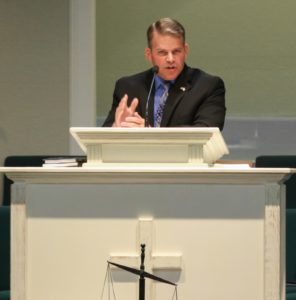 We learn much of Noah’s character in the Bible. He was an outstanding craftsman and had a wonderful family heritage. He was a man of patience and endurance and had a good wife who was willing to follow him as he followed the Lord. He was a man of faith in a culture that was depraved morally, deranged mentally, and dead spiritually. We know that his faith was attested to by others, authenticated by his works, and based on the Word of God. His faith was ignited by fear and moved him to be evangelistic. Noah’s life exalted God. Noah’s faith reminds us that God keeps His Word. Noah’s story proves that God is long-suffering. Noah’s salvation shows that God is just to judge the world. May our works preach to others the Eternal Weight of Glory and the benefits of serving the God Who keeps His promises!
We learn much of Noah’s character in the Bible. He was an outstanding craftsman and had a wonderful family heritage. He was a man of patience and endurance and had a good wife who was willing to follow him as he followed the Lord. He was a man of faith in a culture that was depraved morally, deranged mentally, and dead spiritually. We know that his faith was attested to by others, authenticated by his works, and based on the Word of God. His faith was ignited by fear and moved him to be evangelistic. Noah’s life exalted God. Noah’s faith reminds us that God keeps His Word. Noah’s story proves that God is long-suffering. Noah’s salvation shows that God is just to judge the world. May our works preach to others the Eternal Weight of Glory and the benefits of serving the God Who keeps His promises!
The Eternal Weight of Glory in the Life of Joseph
Chad Estep
Joseph’s life of faith is summarized by his commandment concerning his bones. The 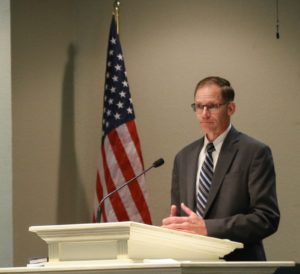 one thing he clung to throughout his life was God’s promise to give his family the land of Canaan. He knew it was God’s plan for them to be in Egypt for a season. He realized God was using him as a means to get them there, and provide for them. Though he seemingly lost all control of his life at the age of 17, he willingly took his own hands off and chose to enjoy the journey, trusting that he would arrive safely at the end. Joseph was repeatedly elevated in his life, and each time he used the experience to elevate his God in the eyes of those around him. May our lives elevate our Savior, that others may see the Eternal Weight of Glory through us.
one thing he clung to throughout his life was God’s promise to give his family the land of Canaan. He knew it was God’s plan for them to be in Egypt for a season. He realized God was using him as a means to get them there, and provide for them. Though he seemingly lost all control of his life at the age of 17, he willingly took his own hands off and chose to enjoy the journey, trusting that he would arrive safely at the end. Joseph was repeatedly elevated in his life, and each time he used the experience to elevate his God in the eyes of those around him. May our lives elevate our Savior, that others may see the Eternal Weight of Glory through us.
The Eternal Weight of Glory in the Life of Sarah
Michael West
 As we study Scripture, it seems that at least a portion of the Eternal Weight of Glory is the revelation and knowledge of God Himself. Over a dozen times, Paul writes of his longing to see and know God. John writes of the day we will be with Him. It matters to God that we love Him and Him alone! Sarah’s story in Hebrews emphasizes that she herself received strength through faith. Until the point at which the Lord visits Abraham and gives the promise of their coming son, all Sarah has known of God has been through Abraham’s testimony. She listened for years to his tales of visions from God, but she herself never encountered God until that day. Although Abraham seemingly recognized he was speaking with the Lord, it is possible that Sarah, listening from inside the tent, laughed at these (apparent) strangers discussing her future. But then, as the Lord heard her laugh and spoke to her, and she realized for the first time Who it was making the promise. As she encountered the Lord for herself, she began to judge Him faithful. May we too begin to experience a portion of the Eternal Weight of Glory in our present lives, as we draw nigh and get to know our God!
As we study Scripture, it seems that at least a portion of the Eternal Weight of Glory is the revelation and knowledge of God Himself. Over a dozen times, Paul writes of his longing to see and know God. John writes of the day we will be with Him. It matters to God that we love Him and Him alone! Sarah’s story in Hebrews emphasizes that she herself received strength through faith. Until the point at which the Lord visits Abraham and gives the promise of their coming son, all Sarah has known of God has been through Abraham’s testimony. She listened for years to his tales of visions from God, but she herself never encountered God until that day. Although Abraham seemingly recognized he was speaking with the Lord, it is possible that Sarah, listening from inside the tent, laughed at these (apparent) strangers discussing her future. But then, as the Lord heard her laugh and spoke to her, and she realized for the first time Who it was making the promise. As she encountered the Lord for herself, she began to judge Him faithful. May we too begin to experience a portion of the Eternal Weight of Glory in our present lives, as we draw nigh and get to know our God!
The Eternal Weight of Glory in the Life of Enoch
Frank Camp
Enoch had a personal translation. There was a purpose for it, and much proof of it as  countless others searched for him, but were not surprised that he was out walking with God! His translation was provided by God. Think of where you would like God to take you – today, tomorrow, and ultimately to heaven! Think of how others were affected by his walk and by his translation! Enoch also had a pleasing testimony that began with an experiential change which was also enduring. It was an exigent change – God took him without waiting for normal circumstances! His change was expectant – God’s plan for all is that we must come to God. Others were impacted as they observed his walk. Enoch preached the Truth. His message included the coming of the Lord and the condemnation on the ungodly. Others were changed as they listened to his preaching. May our life result in the Eternal Weight of Glory for other people, as did Enoch’s.
countless others searched for him, but were not surprised that he was out walking with God! His translation was provided by God. Think of where you would like God to take you – today, tomorrow, and ultimately to heaven! Think of how others were affected by his walk and by his translation! Enoch also had a pleasing testimony that began with an experiential change which was also enduring. It was an exigent change – God took him without waiting for normal circumstances! His change was expectant – God’s plan for all is that we must come to God. Others were impacted as they observed his walk. Enoch preached the Truth. His message included the coming of the Lord and the condemnation on the ungodly. Others were changed as they listened to his preaching. May our life result in the Eternal Weight of Glory for other people, as did Enoch’s.
The Eternal Weight of Glory in the Life of Moses
Bill Wingard
 God’s call on Moses’ life was provoking. He was not prepared, had not taught his family, and had not fully identified with God’s people through circumcision up to this point. But, Moses made choices. He chose the afflictions. He chose to follow God’s calling. Throughout his ministry he faced challenges. In many of those challenges, he plead for God on behalf of those causing him trouble. Though he was faithful in so many areas of his life, when the crisis of water came he made the wrong decision. As a result, his death was a private one outside of Canaan, and God refused him the greatest desire of his life. In his life, we see that decisions have long term consequences, they affect our families, and yet it is worth it all just to serve Christ. May we choose to suffer afflictions in this life, that we may see the Eternal Weight of Glory in the next.
God’s call on Moses’ life was provoking. He was not prepared, had not taught his family, and had not fully identified with God’s people through circumcision up to this point. But, Moses made choices. He chose the afflictions. He chose to follow God’s calling. Throughout his ministry he faced challenges. In many of those challenges, he plead for God on behalf of those causing him trouble. Though he was faithful in so many areas of his life, when the crisis of water came he made the wrong decision. As a result, his death was a private one outside of Canaan, and God refused him the greatest desire of his life. In his life, we see that decisions have long term consequences, they affect our families, and yet it is worth it all just to serve Christ. May we choose to suffer afflictions in this life, that we may see the Eternal Weight of Glory in the next.

